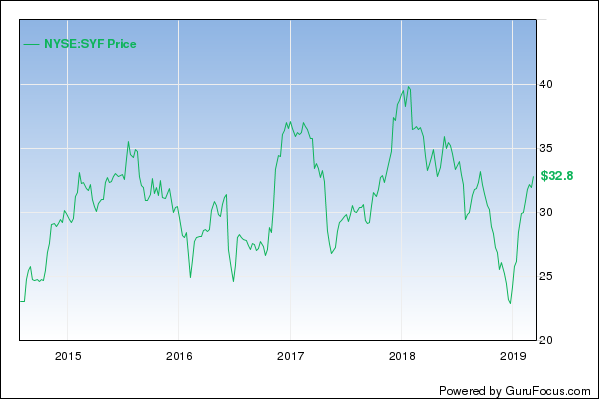Synchrony: A Warren Buffett Bargain Stock
- By Jonathan Poland
Synchrony Financial (SYF) is at the core of private label credit cards issued by retailers, which make up 74% of the company's business. Losing Walmart's private-labeled co-branded credit card contract has been painful for Synchrony's stock. Year to date, shares are down 34%. Since the deal was awarded to Capital One in July, Synchrony's stock is off 24%; however, that has allowed (or forced) it to make deals with other big names, including the purchase of multi-billion dollar consumer loans from PayPal, and growth of its card partnership with Amazon.com.
Warning! GuruFocus has detected 2 Warning Signs with SYF. Click here to check it out.
The intrinsic value of SYF
The contract was terminated because Walmart alleged that Synchrony had breached the terms and was not approving enough applicants. Walmart accounted for about $10 billion in retail card balances for Synchrony, and the contract will end at the end of next July. On top of that, Walmart is suing for $800 million in damages -- likely to be settled out of court, but even that doesn't seem to be slowing the company down.
Berkshire ownership
Warren Buffett (Trades, Portfolio)'s Berkshire Hathaway (NYSE:BRK.A)(NYSE:BRK.B) owns close to 21 million shares. It is likely his portfolio managers who have built the $646 million position. They have been holding this position since the second quarter of 2017. More importantly, the estimates for Synchrony's earnings still put the stock below 7x forward earnings. If anything, Berkshires money managers should be buying more.
The company's bottom-line results are looking great with 9% growth on net interest income and a 30% per-share net advance in the third quarter. Strong purchase volume and loan receivables are driving the top line.
Both Synchrony's return on equity and profit margins average north of 17% and with the stock trading very close to book value ($19.47), once the suit with Walmart is behind it, the stock is worth at least twice its current value. The company is also planning to use as much as $2.5 billion of capital to buy back stock. At this price, it could take more than 10% of its outstanding shares off the market.
The bottom line
Improving credit quality from stricter underwriting principles, which led to Walmart terminating the contract, has been one of the big reasons for Synchrony's financial performance. Walmart is just one fish in the massive retail pond, and Synchrony should be able to maintain and even add significant partner relationships going forward thanks to digital innovations as retail store cards wain in popularity versus mobile payments. The company is on trend to pivot into where the market is going while still maintaining profitability. Synchrony is a buy.
Disclosure: I am not long/short any stock mentioned.
This article first appeared on GuruFocus.
Warning! GuruFocus has detected 2 Warning Signs with SYF. Click here to check it out.
The intrinsic value of SYF

